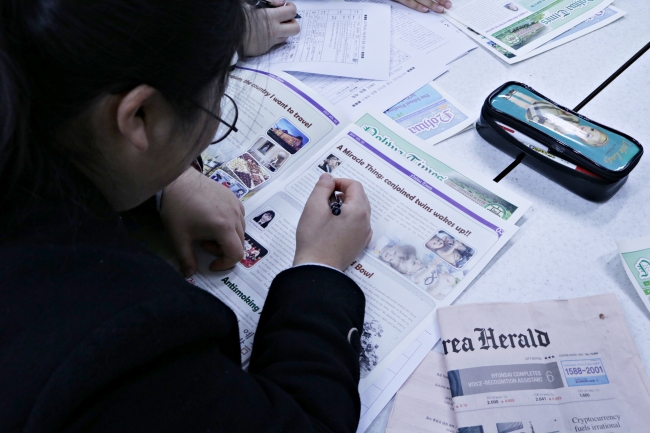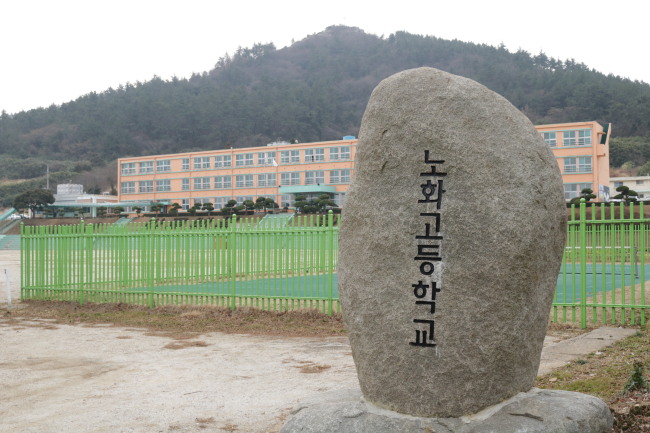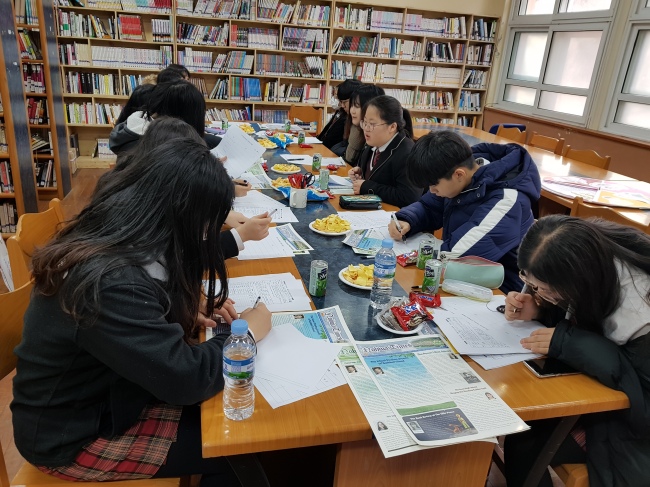NOHWADO, South Jeolla Province -- Lights go out around 9 p.m. in most of the buildings on the island of Nohwado. The day for many of the island’s some 5,000 residents -- largely abalone and seaweed farmers -- begins well before dawn.
Exceptions include the only high school on the 25-square-kilometer island about 375 kilometers south of Seoul, where student journalists stay hard at work until 10 p.m.
Extracurricular sessions, which include supplementary classes, academic programs and club activities, are some of the only alternatives for over a hundred students -- both from Nohwado and the adjacent tourist attraction island Bogildo -- to deal with a lack of access to external sources of education compared to on the peninsula.
Among other extracurricular activities is one using The Korea Herald to help students improve their English writing skills.

A student reviews Nohwa High School’s English-language publication, Nohwa Times. (Son Ji-hyoung/The Korea Herald)
In the fall semester last year, print editions of The Korea Herald began to be delivered to the Times Readers group, which publishes Nohwa High School’s English-language Nohwa Times.
The project, co-sponsored by the Mercedes-Benz CSR Committee and Kids & Futures Foundation, delivers the daily paper to the remote island via a 30-minute southward ferry from the Korean Peninsula’s southernmost hamlet of Ttangkkeut.
Kids & Futures Foundation is a private organization founded by donations from venture companies in 2000 and has since run social services such as educational programs, scholarships and medical services for underprivileged children. The Mercedes-Benz CSR Committee has run key corporate social responsibility programs Mobile Kids, Mobile Academy and All Together since 2014, and kicked off Ausbildung last year.
Nohwa High School is one of nine schools in South Jeolla Province that began subscribing to The Korea Herald in the 2017 fall semester.
In the six sessions held per semester on Fridays at 7 p.m., the 17 students ranging across grades 10 to 12 work on a twice-yearly edition of the Nohwa Times. They also use The Korea Herald to identify words or figures that have become hot topics in Korea and describe them in English.

An external view of Nohwa High School (Son Ji-hyoung/The Korea Herald)
Born and raised on Bogildo, Kim Hyang-yeon, a 12th-grader and founding member of the club, said the newspaper could help narrow the gap that separates them from across the shore.
“Classmates had experienced lack of access to the outside world and had little idea about how to improve English skills,” said Kim, 18. “One day we came to think, why not make use of newspapers in English and grab our future paths or current issues better at our sight?”
Before the activity, English could only be found in textbooks and workbooks for the yearly Suneung college entrance test, added Kim, who graduates next month.
For the Nohwa Times, the students choose to write either about their aspirational career paths or current affairs of personal interest. To write a piece, they are taught to follow a template structure, similar to that of an essay.
For the latest edition published in August, 11th-grader Yoo Tae-young worked on a piece revolving around the Sewol ferry disaster. The 17-year-old avidly followed up on news reports covering the disaster and suppressive countermeasures by the government to quiet the voices of bereaved family members. She even made the trip to Seoul to report on a rally against the former Park Geun-hye administration in 2016.
Park Yeong-seo, another 11th-grader, wrote the article “How will you ever accept artificial insemination?” describing her future career path as a nurse.
The paper also takes submissions from outside the group, including book reviews or selected drafts from the school’s writing evaluations.

Students hold an editorial meeting for Nohwa Times. (Nohwa High School)
English teacher Kang Song-hee, one of the two for the school, supervises the program. Kang, 26, began working at Nohwa High School in 2016.
Originally from Gwangju, the transplant’s duties range from editing students’ articles -- with the help of the other English teacher -- and giving feedback to setting the students extra tasks like keyword lists and moderating debate sessions.
Kang, a homeroom teacher for a class comprising the school’s 17 10th-graders, has seen the number of new students shrink to less than half of the 45 11th-graders in 2017. She was vital in convincing about one-third of the class to join the Times Readers.
With the number of new 10th-graders bouncing back to 32 this year, Kang expressed hopes the students’ efforts to bridge the gap between the school and community prospers.
“My short-term goal is to have students deliver the voices of the community here in the island, something that’s beyond their own story about their own career or interest,” she said.
By Son Ji-hyoung
(
consnow@heraldcorp.com)



![[Exclusive] Korean military set to ban iPhones over 'security' concerns](http://res.heraldm.com/phpwas/restmb_idxmake.php?idx=645&simg=/content/image/2024/04/23/20240423050599_0.jpg&u=20240423183955)

![[Graphic News] 77% of young Koreans still financially dependent](http://res.heraldm.com/phpwas/restmb_idxmake.php?idx=645&simg=/content/image/2024/04/22/20240422050762_0.gif&u=)


